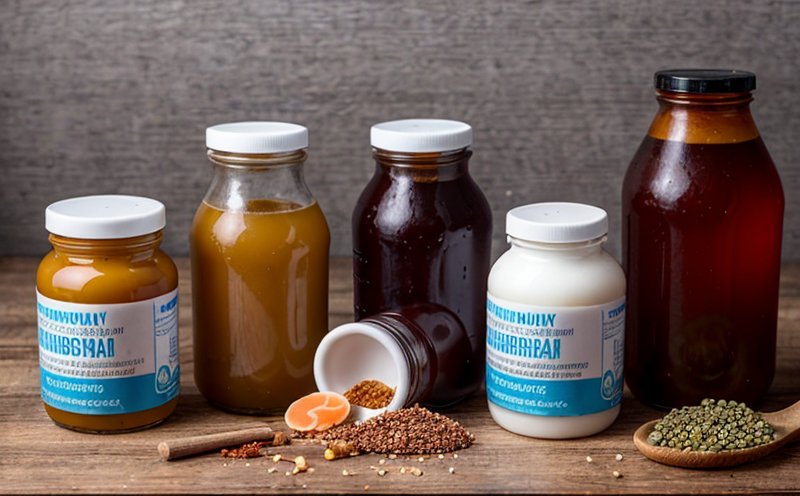Codex Alimentarius Microbial Contaminant Testing in Probiotics
The CAC established by the Food Standards Code (known as Codex Alimentarius) sets international standards, guidelines, and codes of practice related to foods. The microbial safety testing for probiotics under this framework is crucial because it ensures that these products are free from harmful pathogens and meet global health and safety requirements.
The primary goal of this service is to ensure compliance with Codex Alimentarius recommendations regarding the presence of specific microorganisms in probiotic formulations. This includes identifying potential contaminants such as Salmonella, Listeria monocytogenes, E. coli O157:H7, and other pathogens that could pose a risk if they were to enter the supply chain or reach consumers.
To achieve this, our laboratory employs advanced analytical techniques including PCR (Polymerase Chain Reaction), Lateral Flow Assays (LFA), and quantitative real-time PCR (qPCR). These methods allow for precise detection of even trace amounts of potentially harmful microorganisms. The testing process begins with careful sample preparation which involves homogenization followed by appropriate dilution to ensure accurate quantification.
The methodology follows strict protocols outlined in ISO standards such as ISO 11133 for the enumeration of microorganisms on surfaces and in products. For probiotics specifically, we adhere to guidelines provided by Codex Alimentarius which emphasize thoroughness and precision.
A typical workflow includes receiving the sample, performing initial identification steps like Gram staining or API tests, then moving onto more advanced techniques depending on preliminary results. Results are reported within agreed timeframes based on contractual agreements with clients but generally aim for turnaround times under 7 days from receipt of the sample.
The importance of this testing cannot be overstated given that probiotics are often consumed by individuals who may have compromised immune systems or digestive disorders where even small amounts of contamination could lead to severe health outcomes. By ensuring strict adherence to Codex Alimentarius standards, we contribute significantly towards maintaining public confidence in these products.
Our team consists of highly qualified microbiologists with extensive experience in this field. They are committed to delivering accurate results consistently and reliably across all projects undertaken. We pride ourselves on providing not just technical expertise but also excellent customer service throughout every stage of the testing process from initial consultation through final report delivery.
Scope and Methodology
The scope encompasses comprehensive microbiological analysis aimed at detecting and quantifying various types of pathogens that might be present in probiotic products. This includes both Gram-positive bacteria like Listeria monocytogenes, as well as Gram-negative species such as Salmonella spp., E. coli O157:H7, among others.
Our laboratory uses state-of-the-art equipment and methodologies to conduct these tests which follow stringent quality control measures at every step from sample collection through final result interpretation. The process starts with careful preparation of the samples followed by inoculation onto selective media plates designed specifically for isolating target microorganisms.
| Method | Description |
|---|---|
| PCR | DNA amplification technique used to detect specific sequences indicative of harmful bacteria. |
| Lateral Flow Assays (LFA) | Simplified form of immunochromatography useful for rapid detection of certain pathogens. |
| Quantitative Real-Time PCR (qPCR) | Advanced version of PCR used to measure the exact amount of DNA present in a sample, thereby quantifying microorganisms. |
The final step involves interpretation of results against internationally recognized thresholds set forth by Codex Alimentarius. Any exceedance would indicate non-compliance with international standards and necessitate corrective actions to be taken by the manufacturer or supplier involved.
Industry Applications
- FDA compliance for import/export of probiotic products into major markets including Europe, North America, Asia-Pacific region.
- Ensuring quality control in manufacturing processes where raw materials come from diverse geographic locations.
- Vetting third-party suppliers before integrating them into supply chains.
- Maintaining a robust food safety program to protect brand reputation against potential recalls due to contamination incidents involving probiotics.
The demand for probiotic supplements continues to grow, driven by increasing consumer awareness about gut health and immune support. As regulatory bodies around the world adopt stricter standards regarding microbial quality assurance in these products, there is an ever-increasing need for reliable laboratories capable of providing Codex Alimentarius compliant testing services.
Environmental and Sustainability Contributions
- Promotion of sustainable agricultural practices through ensuring only high-quality raw materials are used in production processes which helps reduce waste generation throughout supply chains.
- Reduction in resource consumption by optimizing laboratory procedures to minimize chemical usage during testing while maintaining accuracy.
- Supporting global initiatives aimed at reducing antibiotic resistance by promoting responsible use of antibiotics within the industry through stringent microbial control measures applied during product development stages.
Incorporating these principles into our daily operations enables us to contribute positively towards environmental sustainability goals without compromising on scientific rigor or client satisfaction levels.





